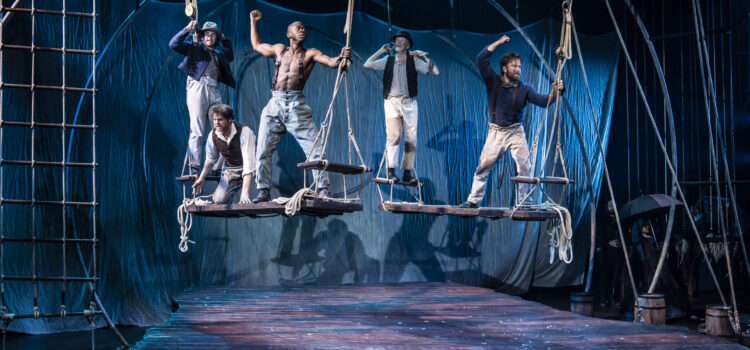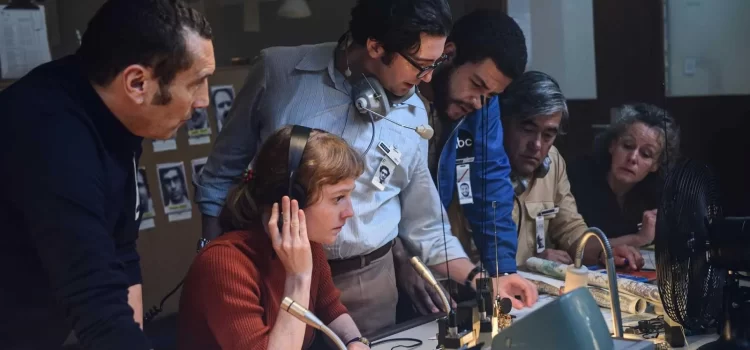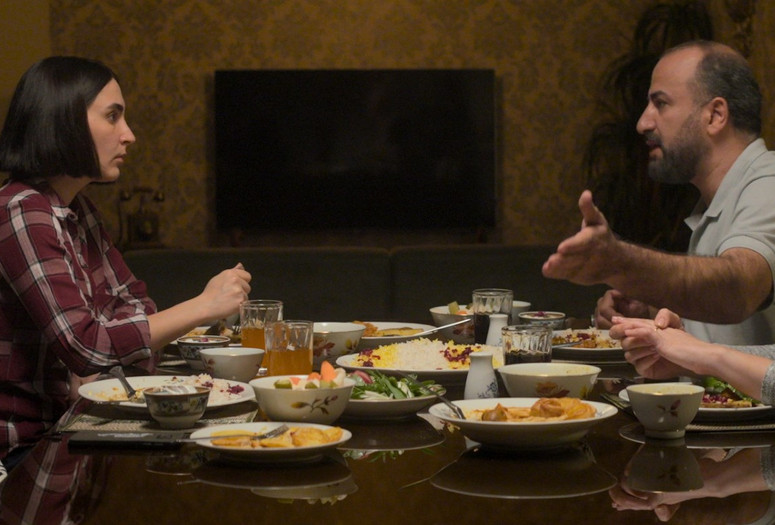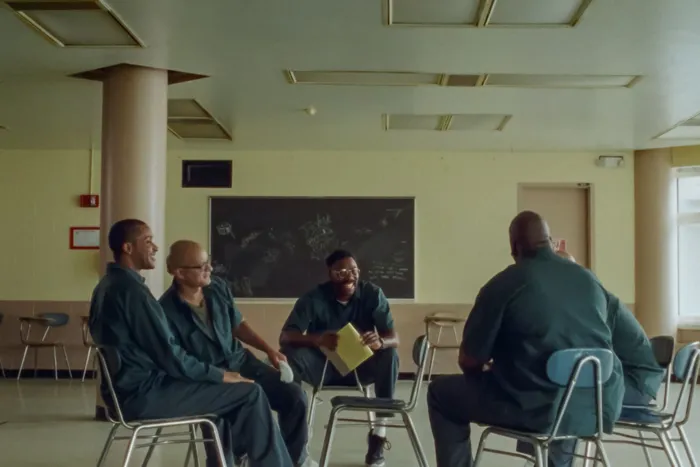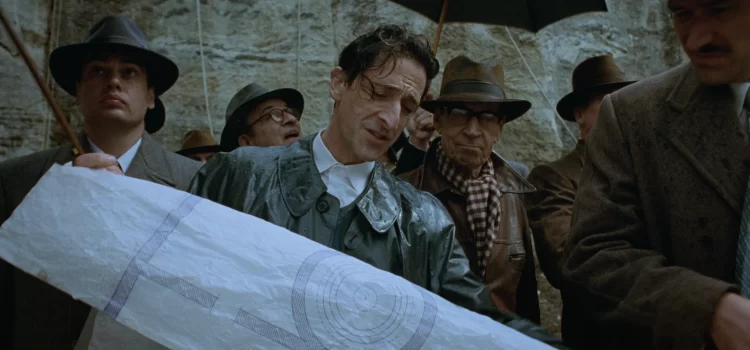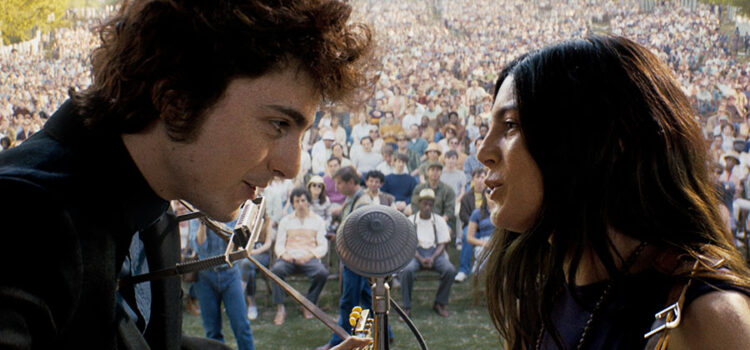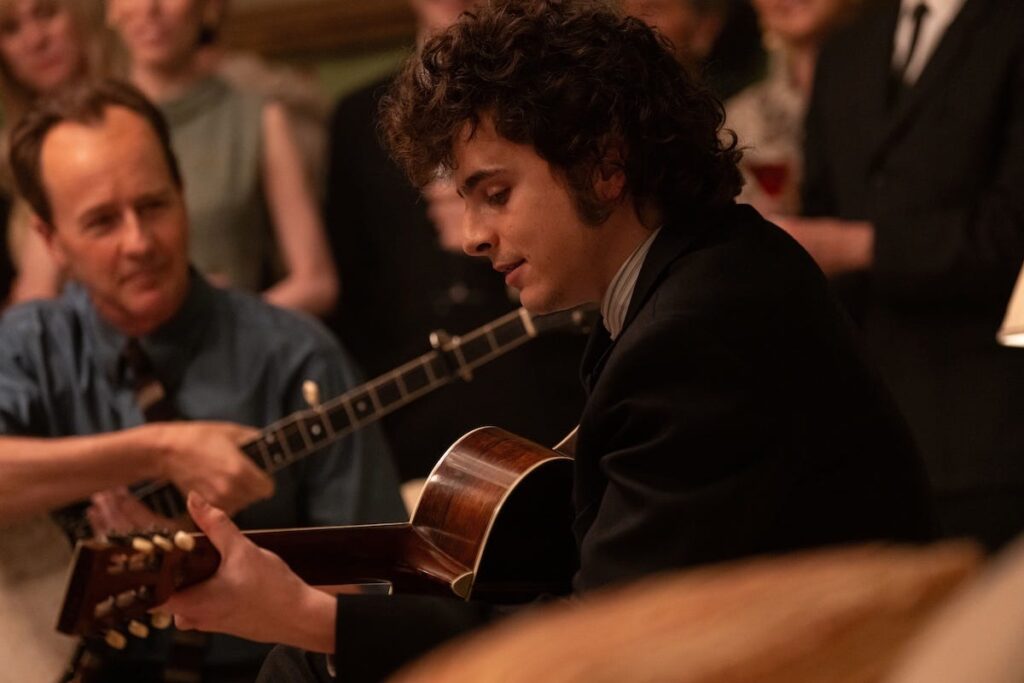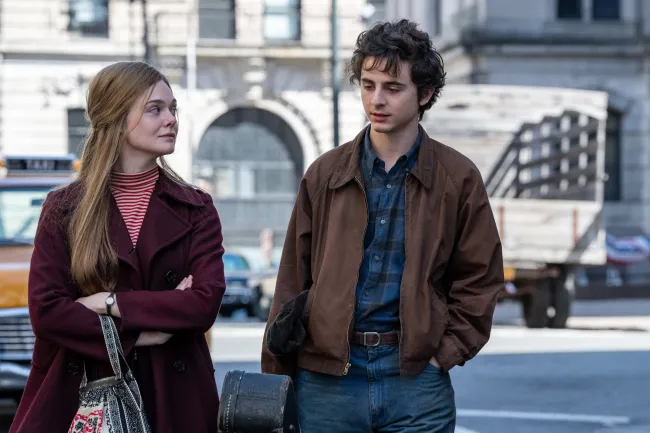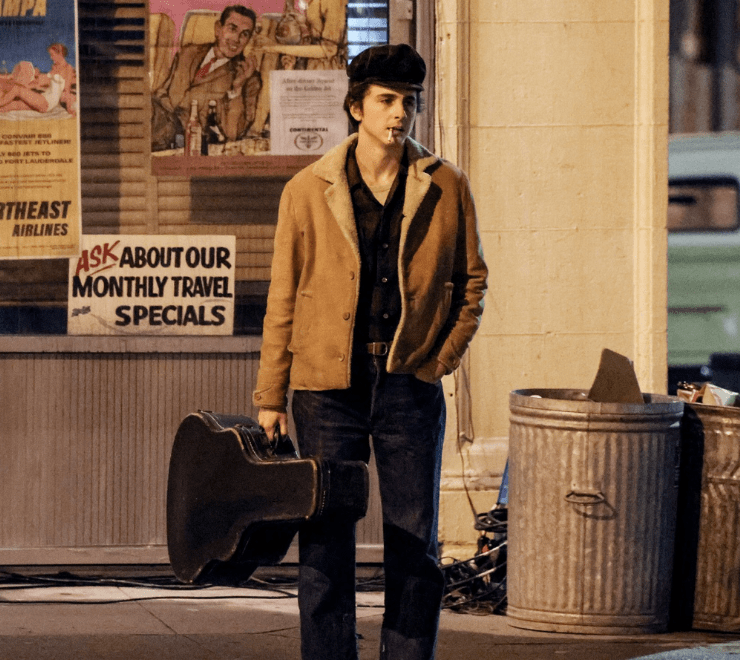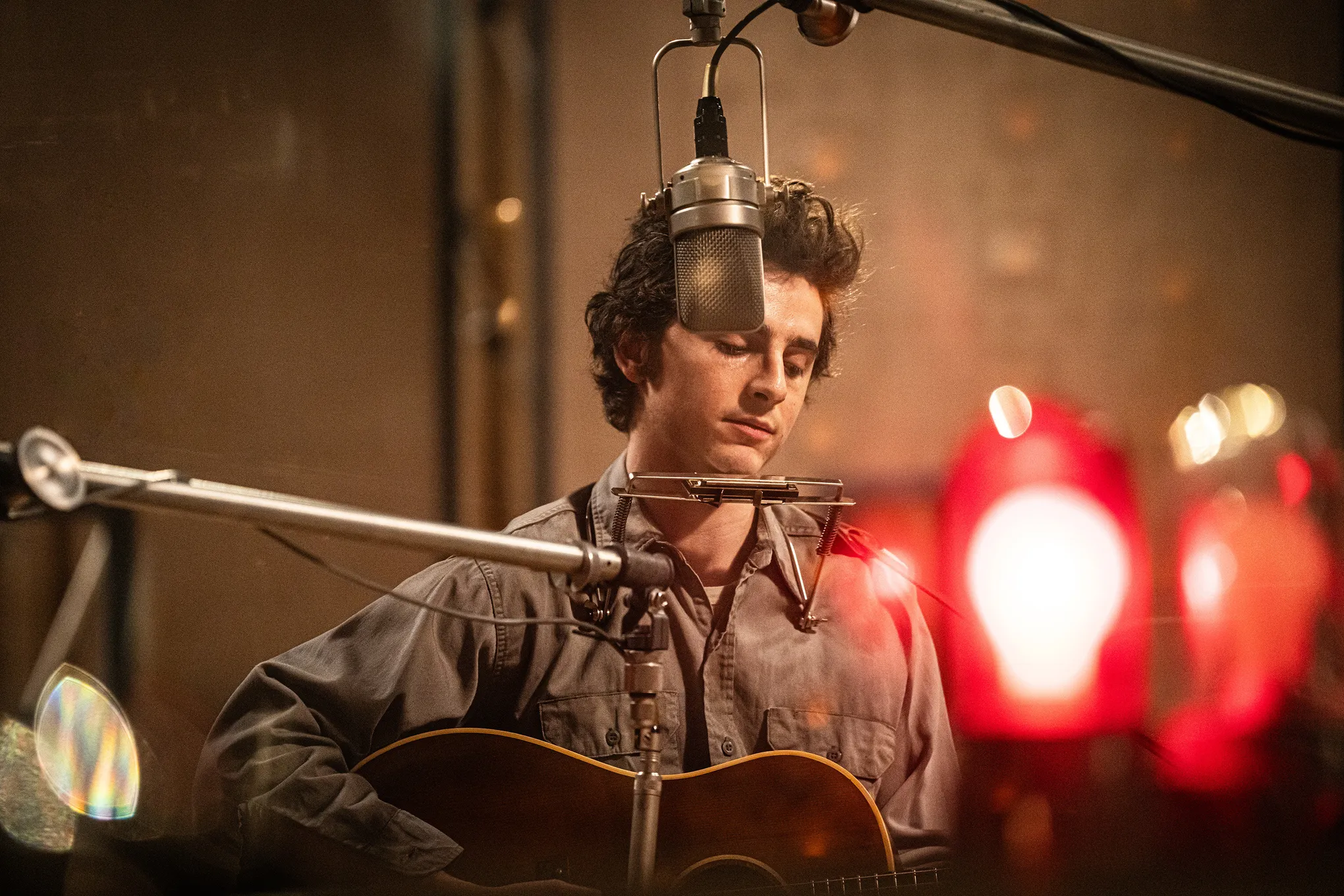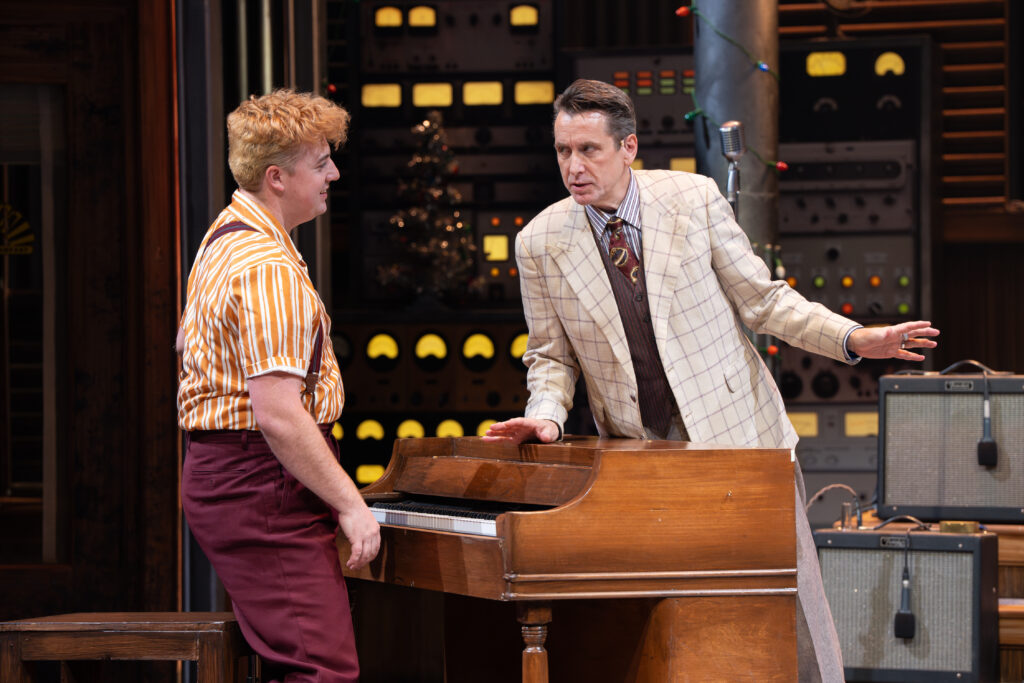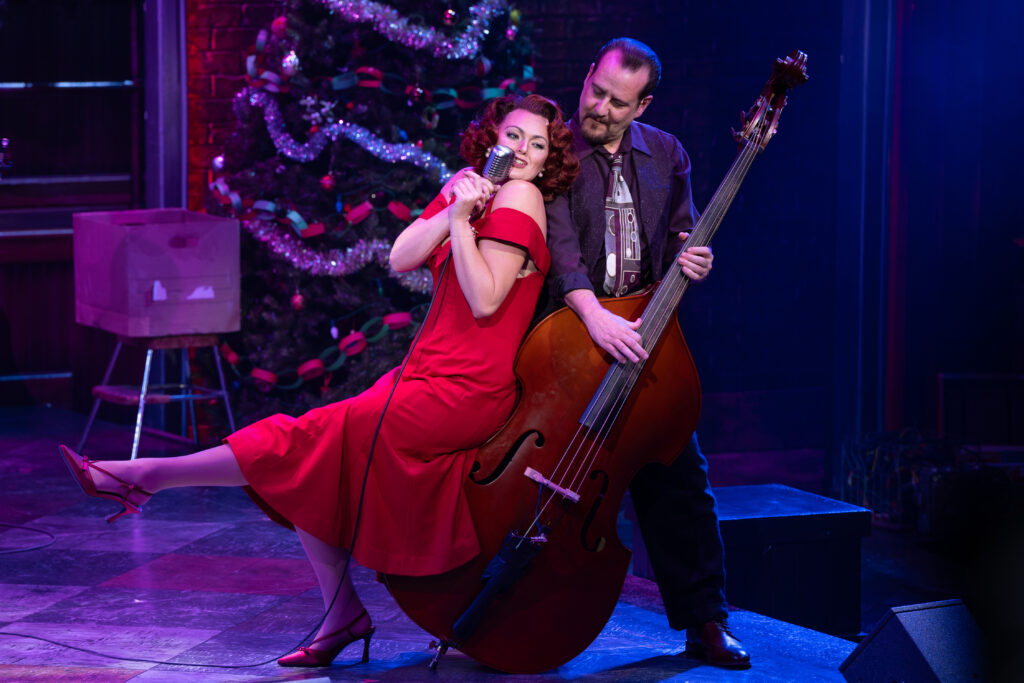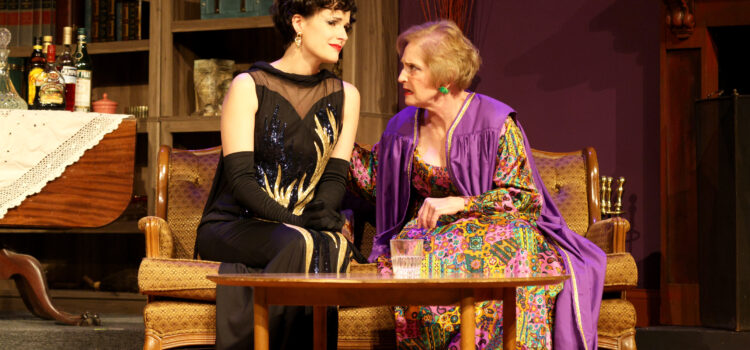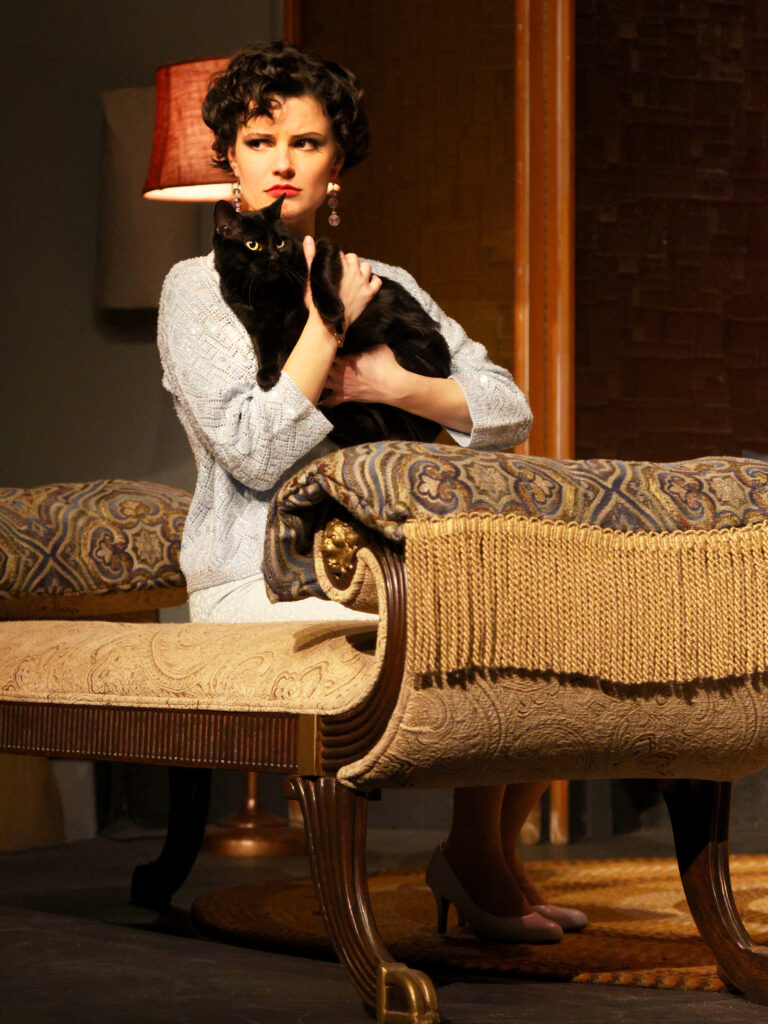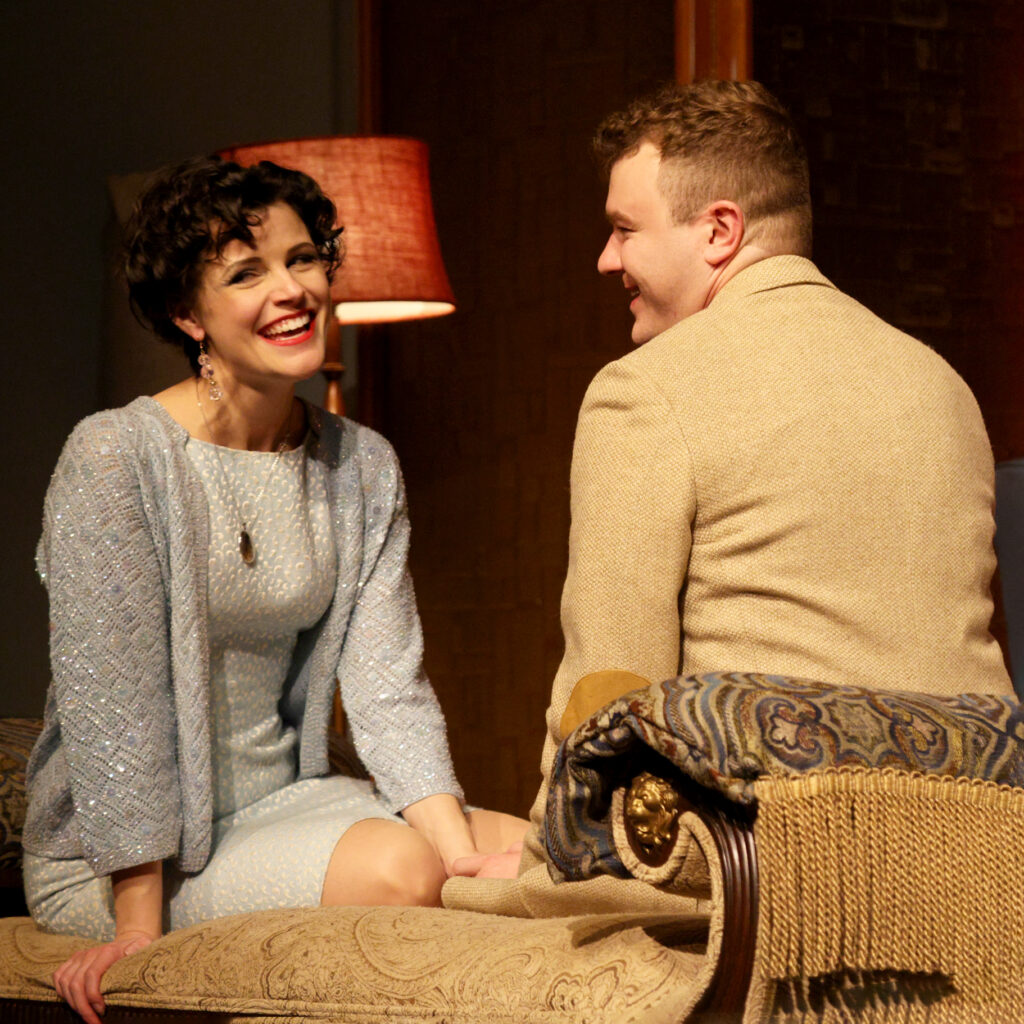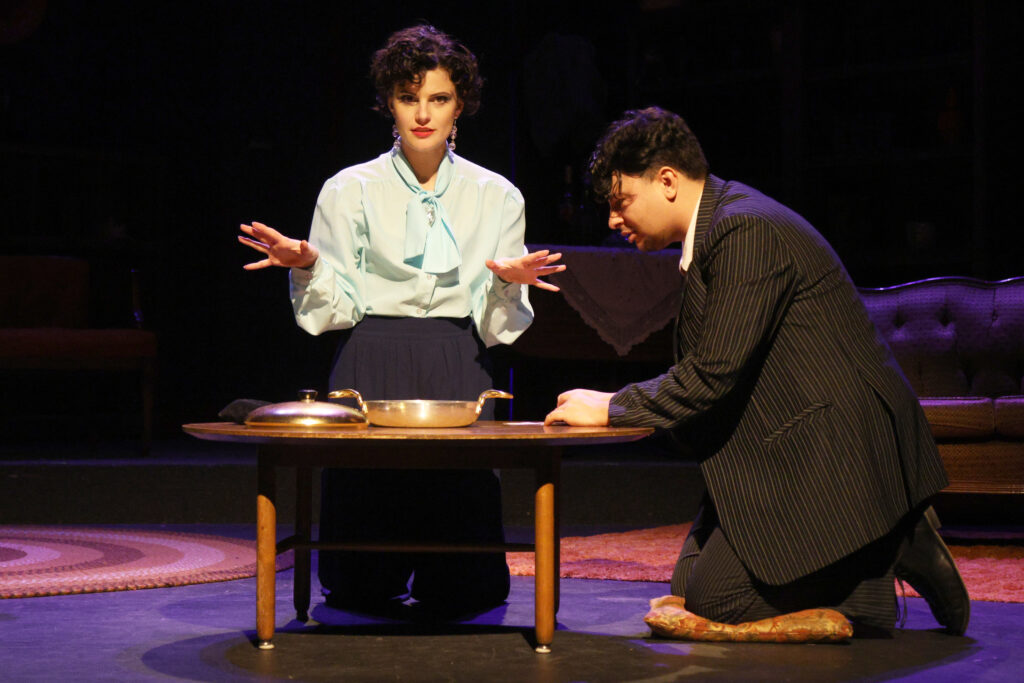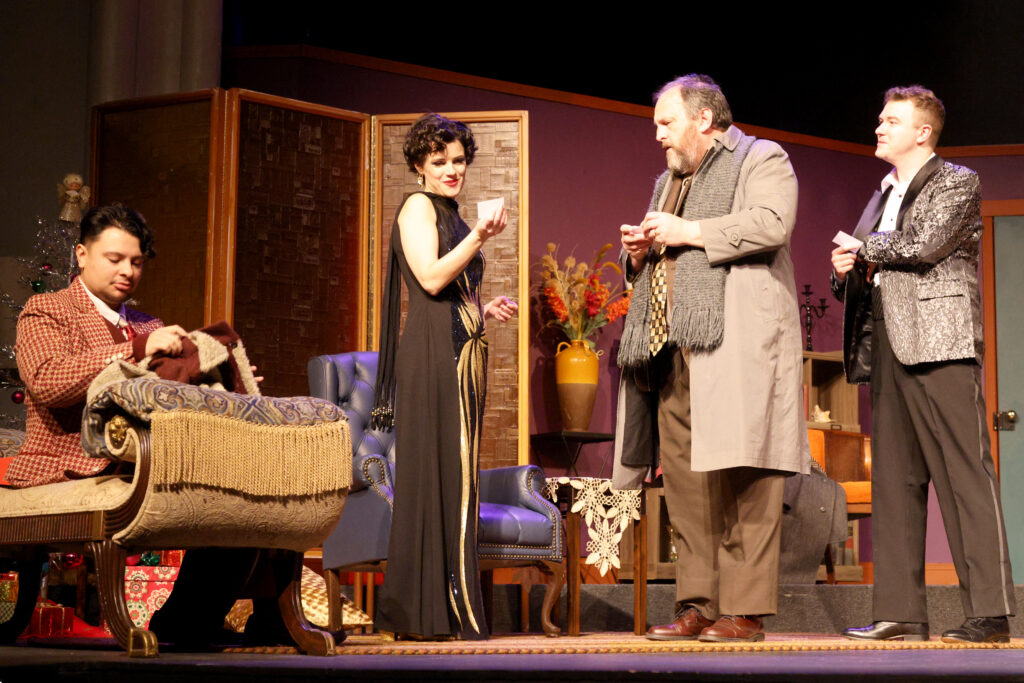By Lynn Venhaus
“Only connect” is a good motto to leave a theater with, where you just saw brilliance shine.
An abundance of new voices and fresh faces mixed with familiar stories and reliable veterans to give us another compelling year of theater among regional professional groups.
Sometimes, there were so many offerings, one couldn’t get to them opening weekend, or my schedule prevented me from early viewing. I attended around 80 eligible shows and am grateful for the theater companies accommodating me. This does not include touring, school or community theatre productions.
I am enriched and in awe of the talent in our midst. And sharing what it feels like to be human in the 21st century is a very wonderful experience. That sense of belonging and community abounds. Onward to a magical year ahead.
As a local theater critic and writer about arts and entertainment, here’s my highly personal annual assessments on 2024 output – my “LOTTIES” – Lynn’s Love of Theatre Awards, as I announce every year. They are not set at five, but categories vary. If I wanted to recognize a performer or a show, I did (my rules).
This is separate from the St. Louis Theater Circle, of which I am a founding member. My esteemed colleagues and I will present our annual awards at a gala ceremony, aka theater prom, on Monday, March 24, at the Loretto-Hilton Center on the Webster University campus. Nominations will be revealed soon.

Production of the Year:
“The Inheritance, Parts I and II” by Tesseract Theatre Company
A 7-hour commitment but worth every minute, riveting from start to finish, with everyone giving their all. Epic in scope and intimate in execution, Tesseract Theatre Company’s production was exhilarating.
Playwright Matthew Lopez wrote a vivid and perceptive rich tapestry of yearning, desire, melancholy, fear, joy, hope, community, and love. Surprising in its wit and depth of feeling, this Tony and Olivier-Award winning play is a magnum opus on what it’s like to be gay in America.
Boldly directed by Stephen Peirick and seamlessly acted by a passionate ensemble, they each met their moments. Intertwining a sprawling cast of 13, Lopez examined healing, survival, what home means and a class divide, inspired by E.M. Forster’s 1910 novel “Howards End.”
It takes place decades after the AIDS epidemic while three generations of gay men grapple with those past tragedies, and the legacies of shame, secrets, and loss, especially at a time when hard-fought rights are available, yet shifting political tides make them vulnerable.
Because Forster examined class differences and hypocrisy in British society in the early 20th century, so does Lopez project his characters in the early 21st century.
In an uncommon structure, Lopez tackled the complexities we all face, connecting characters, ambitions and eras in a swirling, dizzying, fantastic way. It is specific to the LGBTQIA+ experience, but allies could relate.
Companies of the Year:
The Repertory Theatre of St. Louis (large) and Tesseract Theatre Company (small)

The Rep gets the honor, turning around the venerable institution in spectacular fashion after it was on the brink of not surviving in 2023. A change in direction and a rallying community – both faithful and skeptical – helped the reset. So did new Artistic Director Kate Bergstrom, a sunny collaborative charmer whose efforts have been nothing short of astounding, along with managing director Danny Williams, who came aboard in 2022.
Two absolute stunners – “Moby Dick” and “August: Osage County” helped restore the luster in early 2024 while The Studio returned with “The Roommate” and a new partnership with Stages St. Louis for the crowd-pleasing “Million Dollar Quartet Christmas” followed a classic “Dial M for Murder” to deliver on its promises. Enthusiasm and goodwill is palpable at every function.

At the Tesseract Theatre Company, Kevin Corpuz and Brittanie Gunn took over operations, and continued bold moves started by founder Taylor Gruenloh in 2010. “The Inheritance, Part 1 and 2” was a landmark achievement, they shifted to musicals for the summer new play festival, and then their ambitious production of “Anastasia: The Musicals” in the fall cemented the statement that they have arrived. Can’t wait to see what is ahead.

Artist of the Year:
Alan Knoll
Actor-Director Alan Knoll is such a St. Louis fixture that it would be easy to take him for granted, but we never ever do. He’s not one to phone it in, always finds an entry point for us, and continues to stretch his capabilities. Last year, he did some of his finest work yet – as flawed dads in “We All Fall Down” and “August: Osage County,” and as a loyal servant in “Life Is a Dream.”
He also directed the acclaimed drama “Red” for New Jewish Theatre, where he previously helmed “Brighton Beach Memoirs” and “Broadway Bound,” part of Neil Simon’s Eugene trilogy.
In a 40-plus year career, he estimates he has been in more than 150 productions. He has worked at the Black Rep, The Repertory Theatre of St. Louis, The Muny, St. Louis Actors’ Studio, Upstream Theater and Imaginary Theatre Company, and the defunct Insight Theater Company, Dramatic License Productions, HotCity Theatre, Muddy Waters Theatre Company and Theater Factory in St. Louis, and at Arrow Rock Lyceum Theatre, which is one of Missouri’s oldest professional regional theatres, and is about 160 miles from St. Louis.
With his name in the ensemble, you can be assured of a first-rate performance, and with him in the director’s seat, you know you are in for a thoughtful, insightful production.

Producers of the Year
Tom Ridgely, Sr. Louis Shakespeare Festival
As the producing artistic director of the St. Louis Shakespeare Festival since 2018, Tom Ridgely has expanded offerings and community partnerships, and taken an innovative, collaborative approach to their mission. In 2024, he oversaw one of the freshest summer productions yet in Forest Park’s Shakespeare Glen – “As You Like It,” and their TourCo’s “The Tempest” broke attendance records in multiple city parks and outdoor venues. Their work in schools and with young artists is an important component as well. Under his leadership, the organization thrives on reinvention and keeps its audiences engaged. The Shakespeare in the Streets events are eagerly anticipated, and they always attempt new ground.

Andrew Kuhlman and Gayle Seay, Stages St. Louis
Andrew Kuhlman is the homegrown element as executive producer, rose through the ranks, while Gayle Seay brings an astute experienced eye as artistic director at Stages St. Louis. With two seasons under their belt, they showed Stages St. Louis’ audiences that they were moving forward while not messing with the recipe for success that co-founders Jack Lane and the late Michael Hamilton focused on when they started the company in 1987. Andrew, who was mentored by both Jack and Michael, continues to build partnerships while Gayle, familiar with the Stages’ family as a longtime casting director, knows the right people to go to in mounting their shows. They’ve demonstrated that theirs is a strong match, and they build on recent successes. Last season’s “Steel Magnolias,” “Newsies” and “Ragtime” continued the legacy.
Touring Production of the Year: (tie) “The Cher Show,” The Broadway Series at Stifel, and “Jagged Little Pill” at The Fox.

THE MVPs
(Must have excelled in two or more shows this year, not a rookie, and whose presence made a difference)
Rachel Bailey
Ann Hier Brown
Matthew Cox
Jerome (J Samuel) Davis
Isaiah DiLorenzo
Jayson Heil
Bryce Miller
Drew Mizell
Joel Moses
Dustin Petrillo
Ben Ritchie
Jacob Schmidt
Molly Wennstrom
Eric Dean White
Sarah Wilkinson
ONES TO WATCH
Ashwini Aurora
Cory Burke
Jade Cash
Tyson Cole
Rafael Da Costa
Dominic Di Ciccio
Andre Eslamian
Aaron Fischer
Nadja Kapetanovich
Gabriel Paul
Allison Sexton

DYNAMIC DUOS /TRIOS
- Nicole Angeli and Joel Moses in “Lungs” (Albion Theatre)
- John Riddle and Jordan Donica in “Les Miserables” (The Muny)
- Christopher Harris and Dustin Petrillo in “Red” (New Jewish Theatre)
- Nancy Bell and Kelley Weber in “The Roommate” (The Rep)
- Jacob Schmidt and Bryce A. Miller in “Trayf” (New Jewish Theatre)
- Andre Navid Eslamian and Leta DeBardeleben in “Longing”
- Adrianna Jones, Amber Alexandria Rose and De-Rance Blaylock in “Blues in the Night” (The Black Rep)
- Cameron Jamarr Davis and Eileen Engel in “Dutchman” (Soul Siren Playhouse)
- Mitch Henry-Eagles and Molly Wennstrom in “First Date” (New Jewish Theatre)
- Kari Ely and Peter Mayer in “Cat on a Hot Tin Roof” (Tennessee Williams Festival St. Louis)
- Isaiah Henry and Bianca Sanborn in “As You Like It” (St Louis Shakespeare Festival)
- Rachel Tibbetts and Ellie Schwetye in “Romanov Family Yard Sale” (ERA)
- Hailey Medrano and Bridgette Bassa in “We All Fall Down” (New Jewish Theatre)
- Greg Hunsaker and Jane Paradise in “Love in the Time of Nothing,” LaBute New Play Festival.
- Matt Anderson, Jeremy Goldmeier, and Donna Parrone as Haunted House actors in “Ripcord” (Stray Dog Theatre)
BRINGING THE HOUSE DOWN
(Best Musical Numbers)

- Tiffany Mann as Effie singing “And I’m Telling You I’m Not Going” in “Dreamgirls,” The Muny
- Tamar Greene and Shereen Pimentel as Coalhouse Walker and Sarah singing “Wheels of a Dream” in “Ragtime,” Stages St. Louis
- John Riddle as Jean Valjean singing “Bring Him Home” in “Les Miserables,” The Muny
- Jessica Vosk as Jenna singing “She Used to be Mine” in “Waitress,” The Muny
- Shereen Pimentel as Sarah singing “Your Daddy’s Son” in “Ragtime,” Stages St. Louis
- Jordan Donica as Javert singing “Stars” and “Soliloquy” in “Les Miserables” at The Muny.
- Aaron Fischer as Dimitry singing “Everything to Win” in Anastasia,” Tesseract Theatre Company
- Katerina McCrimmon as Fanny Brice singing “Don’t Rain on My Parade” in “Funny Girl” at The Fox.
- The Women (Adrianna Jones, Amber Alexandria Rose and De-Rance Blaylock) singing “Take It Right Back” in “Blues in the Night,” The Black Rep.
- Matthew Cox as Crutchie singing “Letter from the Refuge” in “Newsies” at Stages St. Louis
- Jamaal Fields-Green as Michael Jackson in the “MJ – The Musical” finale in the touring production at The Fox. Whatever that ‘surprise’ move he concocted for the 1992 “Dangerous” World Tour was. One of the most exhilarating things I’ve ever seen in a musical.
BEST YOUTH PERFORMERS
- Will Schulte, “Les Miserables,” The Muny
- Zoe Klevorn, “Ragtime,” Stages St Louis
- Shane Rose, “All My Sons,” New Jewish Theatre
- Riley Carter Adams, “As You Like It,” St. Louis Shakespeare Festival
- Vivian Helena Himes, “Wedding Band,” The Black Repertory Theatre
- Lucy Miller, “Wedding Band,” The Black Repertory Theatre
- Davin Wade, “Newsies,” Stages St. Louis
- Maliah Strawbridge, “Big Machine,” Fly North Theatricals
- Ellie Schwartz (Shprintze) and Zoe Klevorn (Bielke) in “Fiddler on the Roof,” The Muny
BEST NEW PLAYS

- “Longing” by Lize Lewy
- “Elephants’ Graveyard” by Marjorie Williamson, First Run Theatre
- “Love in the Time of Nothing” by Jayne Hannah, St. Louis Actors’ Studio, LaBute New Play Festival
- “Don’t Be a Hero, Thank You” by Katherine Leemon, Prison Performing Arts
- “Romanov Family Yard Sale” by Courtney Bailey, ERA
- “Wolf Kings” by Chuck Harper and Maggie Conroy, Young Liars
- “Am I Dangerous” by e.k. doolin, Contraband Theatre
- “Who’s on First” by Neil LaBute, St. Louis Actors’ Studio, LaBute New Play Festival
- “Cash Flow,” Marjorie Williamson, First Run Theatre
- “Sandra’s Son,” Cbabi Bayoc (work in progress)

BEST COMEDY PRODUCTIONS
- “As You Like It,” St. Louis Shakespeare Festival
- “Trayf,” New Jewish Theatre
- “The Roommate,” The Repertory Theatre of St. Louis
- “Woman in Mind (December Bee),” Albion Theatre
- “Steel Magnolias,” Stages St. Louis
- “Spirits to Enforce,” The Midnight Company
- “Life Upon the Wicked Stage,” Tennessee Williams Festival St. Louis
- “The Tempest,” St. Louis Shakespeare Festival, Tour Co.
- “Romanov Family Yard Sale,” ERA
- “Red Jasper,” Michael Madden Productions
BEST DRAMA PRODUCTIONS
- “The Inheritance, Part 1 and 2,” Tesseract Theatre Company
- “Moby Dick,” The Repertory Theatre of St. Louis
- “All My Sons,” New Jewish Theatre
- “August: Osage County,” The Repertory Theatre of St. Louis
- “Red,” New Jewish Theatre
- “The Whale,” St. Louis Actors’ Studio
- “Cat on a Hot Tin Roof,” Tennessee Williams Festival St. Louis,
- “Life is a Dream,” Upstream Theater
- “Hold On!” The Black Rep
- “Dutchman,” Soul Siren Playhouse

BEST MUSICAL PRODUCTIONS
- “Anything Goes,” The Muny
- “Ragtime,” Stages St. Louis
- “Fiddler on the Roof,” The Muny
- “Anastasia,” Tesseract Theatre Company
- “Newsies,” Stages St. Louis
- “First Date,” New Jewish Theatre
- “In the Heights,” The Muny
- “Blues in the Night, “The Black Rep
- “(Title of Show),” Prism Theatre
- “Waitress,” The Muny
BEST SUPPORTING ACTRESS IN A COMEDY
- Zoe Vonder Haar, “Steel Magnolias,” Stages St. Louis
- Michelle Hand, “As You Like It,” St. Louis Shakespeare Festival
- Kari Ely, “Steel Magnolias,” Stages St Louis
- Molly Wennstrom, “As You Like It,” St Louis Shakespeare Festival
- Susan Wylie, “Woman in Mind (December Bee),” Albion Theatre
- Jasmine Cheri Rush, “As You Like It,” St. Louis Shakespeare Festival
- Ricki Franklin, “As You Like It,” St. Louis Shakespeare Festival
- Anna Blair, “The Butcher of Baraboo,” West End Players Guild
- Liz Mischel, “Bell, Book & Candle,” Stray Dog Theatre
- Ami Loui, “Steel Magnolias,” Stages St. Louis

BEST SUPPORTING ACTOR IN A COMEDY
- Spencer Sickmann, “Trayf,” New Jewish Theatre
- Chuck Winning, “Grief & Woe,” LaBute New Play Festival,
- Isaiah DiLorenzo, “Woman in Mind (December Bee),” Albion Theatre
- Joseph Garner, “Woman in Mind (December Bee),” Albion Theatre
- Cassidy Flynn, “Romanov Family Yard Sale,” ERA
- Danny Brown, “Woman in Mind (December Bee),” Albion Theatre
BEST ACTRESS IN A COMEDY
- Emily Baker, “Woman in Mind (December Bee),” Albion Theatre
- Caroline Amos, “As You Like It,” St. Louis Shakespeare Festival
- Kelley Weber, “The Roommate,” The Repertory Theatre of St. Louis
- LaWanda Jackson, “Don’t Be a Hero, Thank You,” Prison Performing Arts
- Nancy Nigh, “Red Jasper,” Michael Madden Productions
- Joy Christina Turner, “The Tempest,” St. Louis Shakespeare Festival
- Claire Coffey, “Bell, Book & Candle,” Stray Dog Theatre
- Gwynneth Rausch, “Elephants’ Graveyard,” First Run Theatre
- Jan Meyer, “Elephants’ Graveyard,” First Run Theatre
10. (tie) Annie Baker, “Ripcord,” Stray Dog Theatre - (tie) Julie Layton, “Life Upon the Wicked Stage,” Tennessee Williams Festival St. Louis
BEST ACTOR IN A COMEDY
- Jacob Schmidt, “Trayf,” New Jewish Theatre
- Bryce A. Miller, “Trayf,” New Jewish Theatre
- Ben Ritchie “Red Jasper,” Michael Madden Productions
- Alan Knoll, “We All Fall Down,” New Jewish Theatre
- Joel Wilper, “Bell, Book & Candle,” Stray Dog Theatre

BEST SUPPORTING ACTRESS IN A DRAMA
- Nadja Kapetanovich, “The Whale,” St. Louis Actors’ Studio
- Claire Karpen, “August: Osage County,” The Repertory Theatre of St. Louis
- Alex Jay, “King Hedley II,” The Black Rep
- Evann De-Bose, “Hold On!” The Black Rep
- Kari Ely, “Cat on a Hot Tin Roof,” Tennessee Williams Festival St. Louis
- Denise Thimes, “King Hedley II,” The Black Rep
- Astrid Van Wieren, “August: Osage County,” The Repertory Theatre of St. Louis
- Margery Handy, “The Inheritance, Parts 1 and 2,” Tesseract Theatre Company
- Kristen Joy Lintvedt, “All My Sons,” New Jewish Theatre
- Kari Ely, “Wedding Band,” The Black Rep
BEST ACTRESS IN A DRAMA
- Maggie Wininger, “Molly Sweeney,” Albion Theatre
- Ellen McLaughlin, “August: Osage County,” The Repertory Theatre of St. Louis
- Amy Loui, “All My Sons,” New Jewish Theatre
- Nicole Angeli, “Lungs,” Albion Theatre
- Jacqueline Thompson, “Wedding Band,” The Black Repertory
- Eileen Engel, “Dutchman,” Soul Siren Playhouse
- Jennifer Theby-Quinn, “Life is a Dream,” Upstream Theater
BEST SUPPORTING ACTOR IN A DRAMA
- Alan Knoll, “August: Osage County,” The Repertory Theatre of St. Louis
- Jayson Heil, “All My Sons,” New Jewish Theatre
- Dustin Petrillo, “Red,” New Jewish Theatre
- Eric Dean White, “Hold On!” The Black Rep
- Jerome Davis, ‘King Hedley II,” The Black Rep
- Alex C. Moore, “The Inheritance, Parts I and 2,” Tesseract Theatre Company
- Michael James Reed, “August: Osage County,” The Repertory Theatre of St. Louis
- Tyson Cole, “The Inheritance, Parts I and 2,’ Tesseract Theatre Company
- Joseph Garner, “Dark Matters,” West End Players Guild
- Jerry Vogel, “Life is a Dream,” Upstream Theater
- Gary Glasgow, “Life is a Dream,” Upstream Theater

BEST ACTOR IN A DRAMA
- Greg Johnston, “All My Sons,” New Jewish Theatre
- Christopher Harris, “Red,” New Jewish Theatre
- William Roth, “The Whale,” St. Louis Actos’ Studio
- Gabriel Paul, “The Inheritance, Parts 1 and 2,” Tesseract Theatre Company
- Joel Moses, “Lungs,” Albion Theatre
- Reginald Pierre, “Life is a Dream,” Upstream Theatre
- Andre Eslamian, “Longing”
- Enoch King, “Hold On!” The Black Rep
- Cameron Jamarr Davis, “Dutchman,” Soul Siren Playhouse
BEST SUPPORTING ACTRESS IN A MUSICAL
- Lissa De Guzman, “Waitress,” The Muny
- Nicole Michelle Haskins, “Waitress,” The Muny
- Sarajane Clark, “Ruthless,” Stray Dog Theatre
- Rachel Bailey, “Title of Show,” Prism Theatre Company
- Kimmie Kidd-Booker, “Anastasia: The Musical,” Tesseract Theatre Company
- Shereen Pimentel, “Ragtime,” Stages St. Louis
- Lauren Tenenbaum, “American Idiot,” New Line Theatre
- Emily Bautista, “Les Miserables,” The Muny
- Samantha Massell, “Fiddler on the Roof,” The Muny
- Nancy Ticotin, “In the Heights,” The Muny
- Adrianna Hicks “Anything Goes,” The Muny

BEST SUPPORTING ACTOR IN A MUSICAL
- Matthew Cox, “Ragtime,” Stages St. Louis
- George Abud, “Anything Goes,” The Muny
- Matthew Cox, “Newsies,” Stages St Louis
- Fergie L. Philippe, “Disney’s The Little Mermaid,” The Muny
- Donald Kidd, “Anastasia: The Musical,” Tesseract Theatre Company
- James D. Gish, “Les Miserables,” The Muny
- Nick Rashad Burroughs, “Dreamgirls,” The Muny
- Aaron Kamphoefner, “Sweet Potato Queens,” New Line Theatre
- Kevin Chamberlin, “Anything Goes,” The Muny
- Will Bonfiglio, “First Date,” New Jewish Theatre
- Jayson Heil, “First Date,” New Jewish Theatre
- Troy Iwata, “Waitress,” The Muny
- Rafael DaCosta, “Dracula,” New Line Theatre
BEST ACTRESS IN A MUSICAL
- Jessica Vosk, “Waitress,” The Muny
- Tiffany Mann, “Dreamgirls,” The Muny
- Sarah Wilkinson, “Anastasia,” Tesseract Theatre Company
- Marissa McGowan, “Ragtime,” Stages St. Louis
- Sarah Gene Dowling, “Ruthless,” Stray Dog Theatre
- Jill Abramovitz, “Fiddler on the Roof,” The Muny
- Jaelyn Hawkins, “(title of show),” Prism Theatre
- Taylor Quick, “Newsies,” Stages St. Louis
- Katie Orr, “(title of show),” Prism Theatre
- Savy Jackson, “Disney’s The Little Mermaid,” The Muny

BEST ACTOR IN A MUSICAL (Male or Non-binary)
- Adam Heller, “Fiddler on the Roof.” The Muny
- John Riddle, “Les Miserables,” The Muny
- Jordan Donica, “Les Miserables,” The Muny
- Aaron Fischer, “Anastasia,” Tesseract Theatre Company
- Tamar Greene, “Ragtime,” Stages St. Louis
- Benji Santiago, “In the Heights,” The Muny
- Drew Mizell, “Nevermore,” Stray Dog Theatre
- Jay Armstrong Johnson, “Anything Goes,” The Muny
- Al Bastin, “The Big Machine,” Fly North Theatricals
- Clayton Humburg, “American Idiot,” New Line Theatre
BEST ENSEMBLE IN A COMEDY
- “Romanov Family Yard Sale,” ERA
- “Spirits to Enforce,” Midnight Company
- “As You Like It, St. Louis,” Shakespeare Festival
- “Woman in Mind (December Bee),” Albion Theare
- “Red Jasper,” Michael Madden Productions
- “Life Upon the Wicked Stage,” Tennessee Williams Festival St. Louis
- “Ripcord, “Stray Dog Theatre
- “Steel Magnolias,” Stages St. Louis
BEST ENSEMBLE IN A DRAMA
- “The Inheritance, Parts I and 2,” Tesseract Theatre Company2.
- “August: Osage County,” The Repertory Theatre of St. Louis
- “All My Sons,” New Jewish Theatre
- “Hold On!” The Black Rep
- “Cat on a Hot Tin Roof,” Tennessee Williams Festival St. Louis
- “The Whale,” St. Louis Actors’ Studio
- “Moby Dick,” The Rep
- Life is a Dream,” Upstream Theatre
- “King Hedley II,” The Black Rep
- “Hamlet,” St Louis Shakespeare
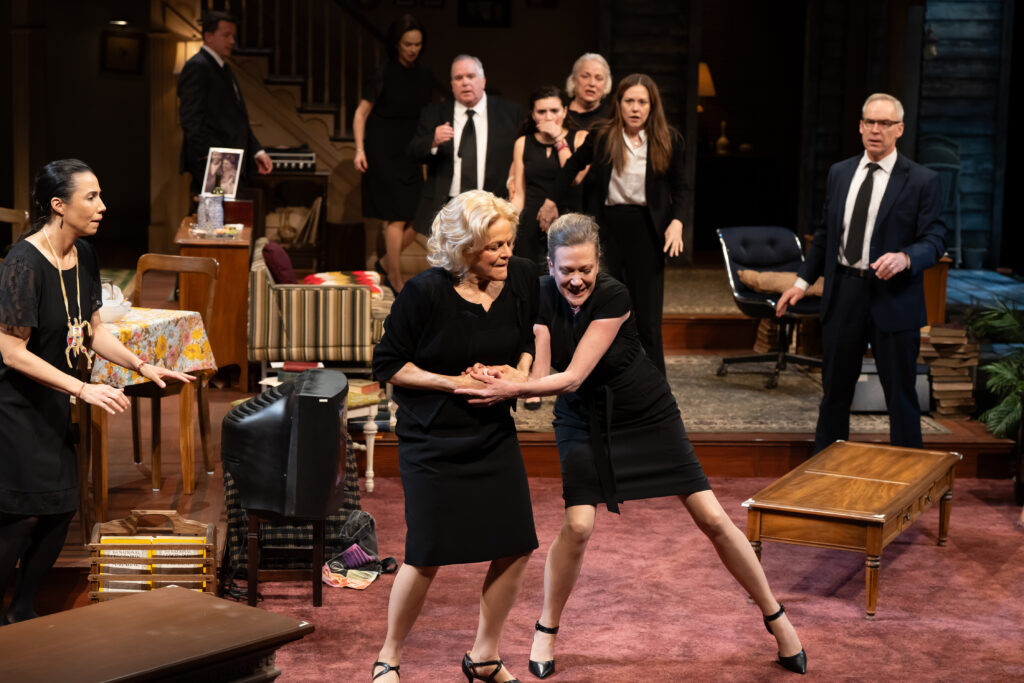
BEST ENSEMBLE IN A MUSICAL
- “Anything Goes,” The Muny
- “Ragtime,” Stages St. Louis
- “Fiddler on the Roof,” The Muny
- “Anastasia,” Tesseract Theatre Company
- “First Date,” New Jewish Theatre
- “In the Heights,” The Muny
- “Newsies,” Stages St. Louis
- “Les Miserables,” The Muny
- ‘(Title of Show),: Prism Theatre Company
BEST LIGHTING DESIGN IN A PLAY
- Jayson M. Lawshee, “Red,” New Jewish Theatre
- Minjoo Kim, “Dial M for Murder,” The Repertory Theatre of St. Louis
- Sean Savoie, “Hold On!” The Black Rep
- William C. Kirkham, “Moby Dick,” The Repertory Theatre of St. Louis
- Denisse Chavez, “As You Like It,” St. Louis Shakespeare Festival
- Denisse Chavez, “All My Sons,” New Jewish Theatre

BEST LIGHTING DESIGN IN A MUSICAL
- John Lasiter, “Fiddler on the Roof,” The Muny
- Rob Denton, “Anything Goes,” The Muny
- Sean Savoie, “Ragtime,” Stages St. Louis
- Jason Lyons, “Disney’s The Little Mermaid,” The Muny
- Tyler Duenow, “Nevermore,” Stray Dog Theatre
- Travis Richardson, “Blues in the Night,” The Black Rep
- Jason Lyons, “Les Miserables,” The Muny
BEST VISUAL PROJECTIONS/DESIGN
1. Zachary Grimm, “Longing”
2. Kylee Loera, “Anything Goes,” The Muny
3. Katherine Freer, “Disney’s The Little Mermaid,” The Muny
4. Zach Cohn, “Hold On!” The Black Rep
5. Joe Taylor, “Romanov Family Yard Sale,” ERA
6. Mike Tutaj, ‘Waitress,” The Muny
BEST SOUND DESIGN IN A PLAY
1. Rick Sims, “Moby Dick,” The Repertory Theatre of St. Louis
2. Zachary Grimm, “Longing”
3. Michael Musgrave-Perkins and Philip Boehm, “Don’t Wait for the Marlboro Man,” Upstream Theater
4. Chuck Harper, “Wolf Kings,” Young Liars
5. Kareem Deanes, “The Roommate,” The Rep
6. Amanda Werre, “All My Sons,” New Jewish Theatre
7. Amanda Were, “Dial M for Murder,” The Rep
BEST COSTUME DESIGN IN A PLAY
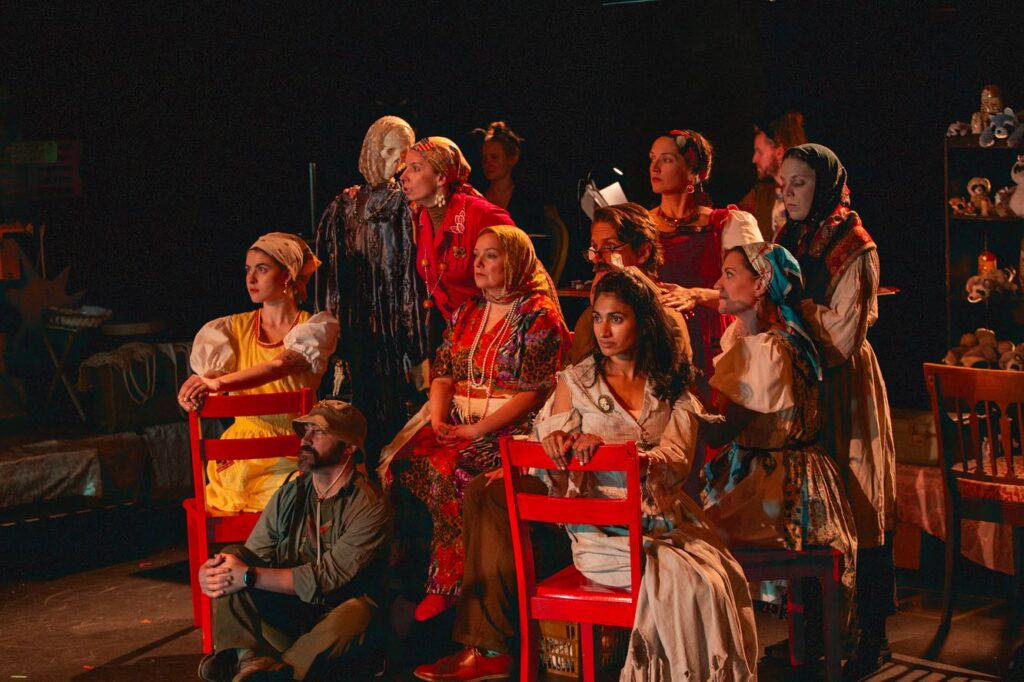
- Carolyn “Sully” Ratke, “Moby Dick,” The Repertory Theatre of St. Louis
- Michele Friedman Siler, “Life Is a Dream,” Upstream Theater
- Colleen Michelson, “Bell, Book and Candle,” Stray Dog Theatre
- Teresa Doggett, “Life Upon the Wicked Stage,” Tennessee Williams Festival St. Louis
- Sam Hayes, The Tempest TourCo, Shakespeare Festival St. Louis
- Marcy Wiegert, “Romanov Family Yard Sale,” ERA.
- Dorothy Marshall Englis, “As You Like It,” St. Louis Shakespeare Festival
BEST COSTUME DESIGN IN A MUSICAL
- Leon Dobkowski, “Dreamgirls,” The Muny
- Sarah Gene Dowling, “Anastasia,” Tesseract Theatre Company
- Brad Musgrove, “Ragtime,” Stages St. Louis
- Tristan Raines, “Anything Goes,” The Muny
- Brad Musgrove, “Newsies,” Stages St. Louis
- Eileen Engel, “Big Machine,” Fly North Theatricals
- Sarah Gene Dowling, “Nevermore,” Stray Dog Theatre
BEST SCENIC DESIGN IN A COMEDY
1. Scott Neale, “As You Like It,” St. Louis Shakespeare Festival
2. Kate Rance, “Steel Magnolias,” Stages St. Louis
3. Andrea Ball, “We All Fall Down,” New Jewish Theatre
4. Gary F. Bell, “Bell, Book & Candle,” Stray Dog Theatre
5. Robert Mark Morgan, “The Roommate,” The Repertory Theatre of St. Louis

BEST SCENIC DESIGN IN A DRAMA
1, Margery Spack and Peter Spack, “Red,” New Jewish Theatre
2. Margery Spack and Peter Spack, “Dial M for Murder,” The Repertory Theatre of St. Louis
3. C. Otis Sweezey, “All My Sons,” New Jewish Theatre
4. Courtney O’Neill, “Moby Dick,” The Repertory Theatre of St. Louis
5. Rob Corbett, “Elephants’ Graveyard,” First Run Theatre
6. Timothy Jones, “King Hedley II,” The Black Rep
BEST SCENIC DESIGN IN A MUSICAL
- Wilson Chin, “Waitress,” The Muny
- Ann Beyersdorfer, “Newsies,” Stages St. Louis
- Ann Beyersdorfer, “Disney’s The Little Mermaid,” The Muny
- Arnel Sancianco, “In the Heights,” The Muny
- Edward E. Haynes Jr., “Anything Goes,” The Muny
- Jamie Bullins, “Blues in the Night,” The Black Rep
- Adam Koch, “Million Dollar Quartet Christmas,” The Rep and Stages St. Louis

BEST CHOREOGRAPHY
- Jared Grimes, “Anything Goes,” The Muny
- Lindsay Joy Lancaster, “Newsies,” Stages St. Louis
- William Carlos Angulo, “In the Heights,” The Muny
- Sylvia Hernandez-DiStasi, “Moby Dick,” The Rep
- Mike Hodges, “Xanadu,” Stray Dog Theatre
- Michelle Sauer, “AnastasiaL The Musical,” Tesseract Theatre Company
- Lesia Kaye, “Dreamgirls,” The Muny
- Chelsie Johnston, “American Idiot,” New Line Theatre
- Parker Esse (original choreography by Jerome Robbins), “Fiddler on the Roof,” The Muny
10. Patrick O’Neill, “Disney’s The Little Mermaid,” The Muny
BEST MUSICAL DIRECTOR
- James Moore, “Les Miserables,” The Muny
- Khalid McGee, “Blues in the Night,” Black Rep
- Roberto Sinha, “In the Heights,” The Muny
- Darryl Archibald, “Fiddler on the Roof,” The Muny
- E. Renee Gamez, “Ragtime,” Stages St. Louis
- Zach Neumann, “Anastasia,” Tesseract Theatre Company
- John Gerdes, “American Idiot,” New Line Theatre
- Mallory Golden, “Title of Show,” Prism Theatre Company
- Larry Pry, “First Date,” New Jewish Theatre
- Dave Sonneborn, “Million Dollar Quartet Christmas,” The Rep and Stages
BEST DIRECTOR OF A COMEDY
- Nancy Bell, “As You Like It.” St. Louis Shakespeare Festival
- Aaron Sparks, “Trayf,” New Jewish Theatre
- Rebekah Scallet, “The Roommate,” The Rep
- Lucy Cashion, “Spirits to Enforce,” The Midnight Company
- Gary F. Bell, “Bell, Book and Candle,” Stray Dog Theatre
- Brian Hohlfeld, “Life Upon the Wicked Stage,” Tennessee Williams Festival St. Louis

BEST DIRECTOR OF A DRAMA
- Stephen Peirick, “The Inheritance, Parts I and 2,” Tesseract Theatre Company
- David Catlin, “Moby Dick,” The Repertory Theatre of St. Louis
- Alan Knoll, “Red,” New Jewish Theatre
- Gary Wayne Barker, “All My Sons,” New Jewish Theatre
- Annamaria Pileggi, “The Whale,” St. Louis Actors’ Studio
- Ron Himes, “Hold On!” The Black Rep
- Philip Boehm, “Life is a Dream,” Upstream Theater
- Ellie Schwetye, “Lungs,” Albion Theatre
- Kay Ailee Bush, “Longing,”

BEST DIRECTOR OF A MUSICAL
- Brittanie Gunn, “Anastasia,” Tesseract Theatre Company
- Marcia Milgrom Dodge, “Anything Goes,” The Muny
- Rob Ruggiero, “Fiddler on the Roof,” The Muny
- Sam Hayes, “(Title of Show),” Prism Theatre Company
- William Carlos Angulo, “In the Heights,” The Muny
- Lee Ann Mathews, “First Date,” New Jewish Theatre
- Deidre Goodwin, “Ragtime,” Stages St. Louis
- Lili-Anne Brown, “Waitress,” The Muny
- John Tartaglia, “Disney’s The Little Mermaid,” The Muny
- Justin Been, “Nevermore,” Stray Dog Theatre


Lynn (Zipfel) Venhaus has had a continuous byline in St. Louis metro region publications since 1978. She writes features and news for Belleville News-Democrat and contributes to St. Louis magazine and other publications.
She is a Rotten Tomatoes-approved film critic, currently reviews films for Webster-Kirkwood Times and KTRS Radio, covers entertainment for PopLifeSTL.com and co-hosts podcast PopLifeSTL.com…Presents.
She is a member of Critics Choice Association, where she serves on the women’s and marketing committees; Alliance of Women Film Journalists; and on the board of the St. Louis Film Critics Association. She is a founding and board member of the St. Louis Theater Circle.
She is retired from teaching journalism/media as an adjunct college instructor.

